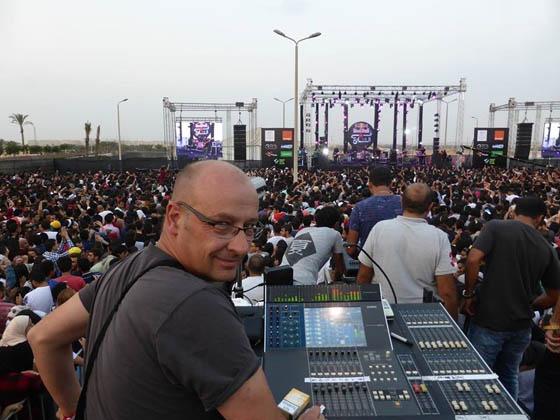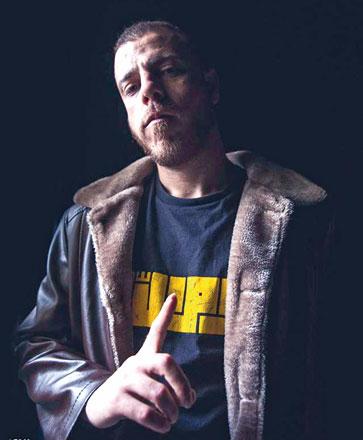You are here
English sound engineer calls for better incentives for indie music scene in Jordan
By Saeb Rawashdeh - Jun 16,2017 - Last updated at Jun 16,2017

British sound engineer, music producer and guitarist Dave Scott mixes during a musical performance in Cairo recently (Photo courtesy of Dave Scott)
AMMAN — The indie scene is a relatively new musical field in Jordan, according to English sound engineer, music producer and guitarist Dave Scott.
“When I first came [to Jordan] in 2009 there didn't appear to be an indie scene. It took me some time to discover who was creating their own original material,” Scott said. All artists in Jordan are technically speaking "independent" as there is no record labels to fund, market and support them, he noted.
However, he continued, if people are talking about an "indie" scene as a kind of genre, then it was practically non-existent or just completely invisible.
“Bands, that are now quite well known, were in their infancy around this time, for example, Autostrad and El Morabba3,” he underlined.
Aziz Maraka and Tareq Al Nasser had been creating their music for quite a while, but not in a genre whereby they could be called "underground" in any way, the sound engineer explained.
"Jadal were kind of out on their own as a guitar pop/rock band playing original material with their own style," he said.
One of the problems, Scott stressed, is the difficulty for artists to find locations to practise and play their music, as well as the "prohibitive costs" of doing so.
"The shortage of available venues is holding back music in Jordan to a massive extent and it's the single biggest problem for musicians," he underlined.
Putting some sound and lighting equipment together for a small show could easily exceed the available budget and all the profits made through ticket sales, Scott said, adding that this would leave the artists highly vulnerable and discourage their own entrepreneurship.
The equipment suppliers and rental companies make their basic income from the lucrative wedding and corporate market, he noted, adding that they expect musicians and small audiences to be able to pay similar rates.
It is impossible for artists to afford such rates, so it creates huge financial obstacles to any live performance, Scott concluded.
Brought up in Liverpool in the 70s and 80s, Scott remembers very well the socioeconomic problems of the Thatcher era and their impact on creativity: “Liverpool was one of the poorest cities of Europe at that time. The government decided to create a massive pool of unemployment as a means of driving down wages, disempowering trade unions and generally having open warfare on the poor and working classes."
He continued: "In Liverpool, they had a specific policy called ‘managed decline’, which consisted in stripping all means of self-support from the people, making them dependant on the central government, to then call them scavengers when the policy succeeded."
However, the musician noted that these economic hardships gave a boost to the “genuinely creative people of Liverpool", allowing the underground scene to flourish "like never before”.
“In the very early 1980s, I was playing guitar in several bands while teaching myself sound engineering and getting involved in the technical side of the music business,” Scott said, stressing that he had never intended to do anything like sound engineering for a living, but that people began paying him and asking him to get involved in their projects.
“Thirty-six years and several million album sales later, I am still doing it,” he said.
Since his arrival in Amman, Scott has collaborated with many leading local bands, including Jadal, El Morabba3, Autostrad, Ayloul, Zaed Naes, 47soul, Tareq Al Nasser and Aziz Maraka.
“I'm really not interested in people who only play cover versions or ‘classics’,” he said, noting that, even if each band does a few versions of other bands’ work, the idea is to “push the band to create something on its own”.
The local scene is sometimes too small for aspiring artists, so they have to leave the region, he said, citing the case of 47soul, a Jordanian/Palestinian band who “decided to move up to the next level, which, unfortunately for Jordan, meant leaving Amman and basing themselves in London”.
“This seems to be the only way for musicians in the region to progress to the world stage, which 47soul has done and continues to do,” he stated, adding that he continues to collaborate with them on their studio productions and live shows.
“When Hamza, the guitarist for Autostrad, left to form the band 47soul, I played some guitar solos at some of the Autostrad shows [at the same time as mixing the show] while they were auditioning for a replacement for Hamza,” he remembered.
Regarding the collaboration with the veteran band Mirage, Scott said he has been mixing their new album, which is “a very eclectic collection of music styles”.
“I have no idea what their plans for the future are, but they really should get the album out to the people as soon as possible,” he emphasised.
Related Articles
AMMAN — David Scott has seen it all in the music industry.
AMMAN — Tareq Abu Kwaik, better known by his stage name El Farai, played two concerts in Amman last week.
AMMAN - A local independent band sees music as a means of artistic self-expression that enables them to “utilise” their human potential in a

















